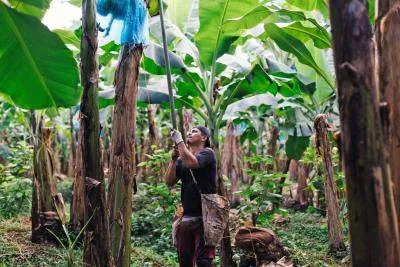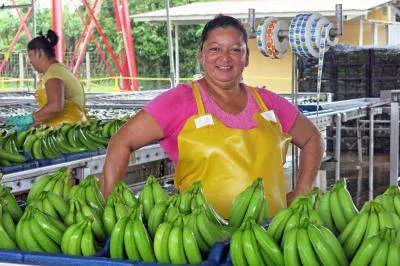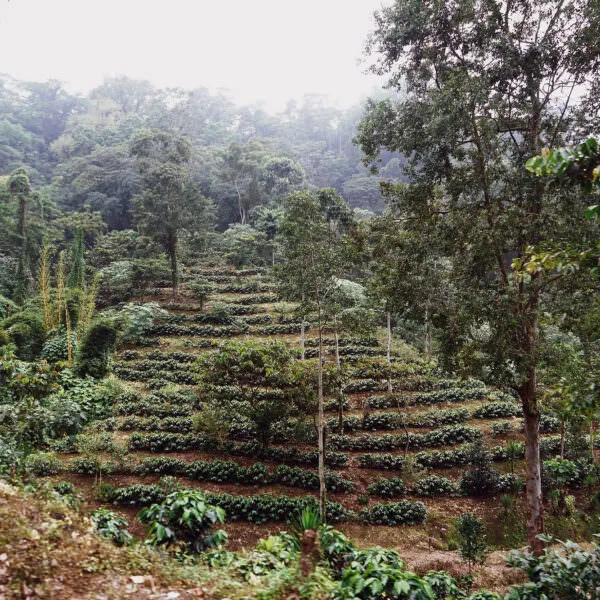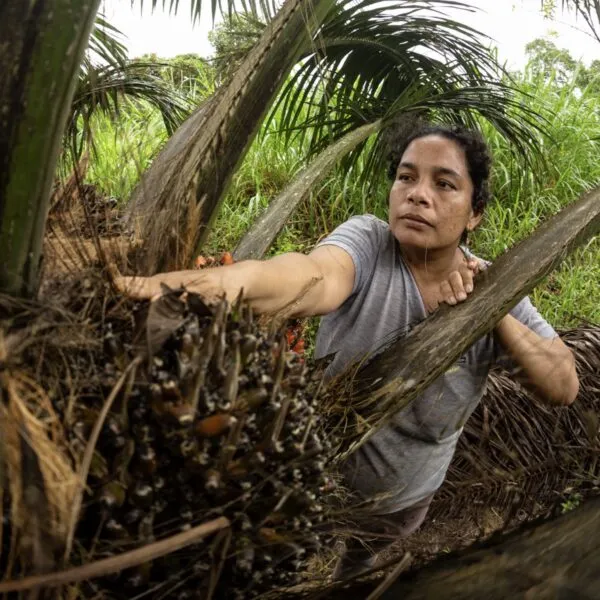The world loves bananas. In 2020, global exports reached an estimated 20.2 million metric tonnes—making bananas one of the world’s most important food crops. Back in the early 1990s, in the first years of the Rainforest Alliance, we made it a priority to transform an industry that was once synonymous with worker abuse, rampant deforestation, and the ruin of streams, rivers, and coral reefs.
Over the years we’ve worked with most of the world’s biggest companies to improve their banana supply chains, trained farmers in more sustainable growing methods, and built partnerships with local communities, NGOs, and scientists committed to changing the industry. Although significant challenges remain, our alliance has made meaningful progress in reducing environmental harm and human exploitation in the 19 countries covered by our banana certification program. Today, that program is one of the largest in the world—advancing sustainable farming methods and better livelihoods for more than 185,000 workers across Latin America, Africa, and Asia.
Together, we’re building a future where people and nature thrive. Sign up today and join our movement.
"*" indicates required fields
Platanera Río Sixaola: the first Rainforest Alliance Certified banana plantation
On the southern edge of Costa Rica’s Caribbean coast, Platanera Río Sixaola nestles between lowland rainforest and tropical wetlands. Since achieving Rainforest Alliance certification in 1992, Río Sixaola has gone above and beyond the requirements of our agricultural standard, continuously setting and meeting new and even more ambitious sustainability goals—including becoming 100 percent carbon-neutral.
Here, farmers truly work in harmony with nature: Lush green groundcover nourishes fertile soils, and native trees line the banks of local streams, protecting against erosion and floods during heavy rain. And all this while boosting productivity without further expansion. Such measures have made the farm a refuge for local wildlife, which often appear on cameras positioned to monitor their populations.
How we work for better bananas
Río Sixaola is a shining example of what can be achieved through the “continuous improvement” approach to sustainability. It’s no surprise that the Rainforest Alliance has been a catalyst for the farm’s sustainability journey, since our certification program has promoted better practices across the sector at large. “Certification has helped create awareness about avoiding banana expansion. It makes us implement better farming practices to increase our productivity” on existing cropland, said Dr. Luis Pocasangre, the research director at Earth University in Limon, in the heart of Costa Rica’s banana-producing region.
Pocasangre also noted that the Rainforest Alliance Sustainable Agriculture Standard has been an important teaching tool for the agronomy students who flock to his program from around the world. Moving forward, our enhanced 2020 Certification Program builds on this body of practice with a strengthened emphasis on climate resilience, continuous improvement, and data-powered assurance mechanisms.
Helping banana farmers fight climate change
Banana farmers across the tropics are feeling the effects of the climate crisis: extreme weather changes, unpredictable rainfall, and the spread of pests and diseases to new regions. As global temperatures continue to soar, wide-scale uptake of climate-smart agricultural methods is critically urgent.
Low-lying banana farms, for example, are particularly vulnerable to storms and floods, which are increasing in intensity as global temperatures rise. Flooding can lead to severe soil erosion, which is terrible for both farm productivity and downstream communities. The climate-smart solution to this problem happens to be a longstanding measure in our standard that was initially designed to protect waterways: planting trees along streams and rivers. During heavy rains, these natural barriers can help prevent waterways from bursting their banks and can stop fertile earth from being washed away.
Boosting climate resilience helps banana farmers preserve—and even improve—their livelihoods. It also helps protect important natural ecosystems. Together with local partners in Guatemala and Ecuador, we have trained more than 6,600 banana farmers and farm workers in natural pest control techniques—a win-win approach that is helping them tackle the dramatic rise in climate-driven pest outbreaks, while also protecting local communities and ecosystems from exposure to harmful agrochemicals.
Protecting workers’ rights on banana farms
Across banana farms from Ecuador to the Philippines, our certification programs advance the rights of thousands of workers around the world. As a priority, our standards require farms to uphold the right to freedom of association. This is an essential first step towards ensuring that workers can freely voice their concerns and collectively bargain on labor issues.

Dangerous working conditions are a particularly alarming problem in this sector—due, in large part, to the use of toxic agrochemicals. As the banana plant is especially vulnerable to pests and disease, farmers rely heavily on strong pesticides that can seriously affect the health of workers—as well as nearby communities and local wildlife.
Rainforest Alliance certification strictly limits the use of pesticides. The harshest chemicals are banned under our Sustainable Agriculture Standard, and we promote natural pest control as the first line of defense. In cases where pesticides are absolutely necessary to prevent total decimation of the crop, our standards require farms to use low toxicity options and provide workers with extensive safety training, protective gear, and washing stations. In 2019, an independent study by Wageningen University found that workers at Rainforest Alliance Certified banana farms in Colombia were more likely to use all their protective equipment, compared to workers at non-certified farms.
Building better livelihoods with Rainforest Alliance Certified bananas
Despite high global demand for bananas, most farmers receive extremely low prices for their crop. In fact, many earn so little that it becomes very challenging for them to run their farms, let alone pay their workers a living wage. This is the amount of money workers need to ensure a decent standard of living for themselves and their whole family—enough to meet basic expenses, like food and housing, with a little left over to cover the unexpected.

On Rainforest Alliance Certified banana farms, we require farmers to pay the legal minimum wage while making clear progress toward a living wage. Our Certification program introduces key innovations that help farmers easily track what they pay their workers (wages plus in-kind benefits) and compare this total to the appropriate living wage benchmark in their country. If a wage gap is discovered, farmers must then develop and implement a wage improvement plan in consultation with workers’ representatives.
What can companies, governments and consumers do?
The responsibility for sustainable transformation cannot fall on farmers’ shoulders alone. Given the low market price for bananas, the costs of investing in sustainability is more than most farmers can afford. To drive deep-rooted, systemic change at a global scale, companies and governments need to take a leading role. The Rainforest Alliance Certification Program puts a much stronger emphasis on our shared responsibility in this journey. We’re building on our strong partnerships and working with some of the world’s biggest companies to underscore the importance of shared investments in sustainability and the need to reward farmers who are making progress.
Likewise, we’ve been working with the banana sector to implement our certification program, and also raising awareness among consumers that choosing Rainforest Alliance Certified bananas increases demand that, in turn, supports a more responsible banana sector.



